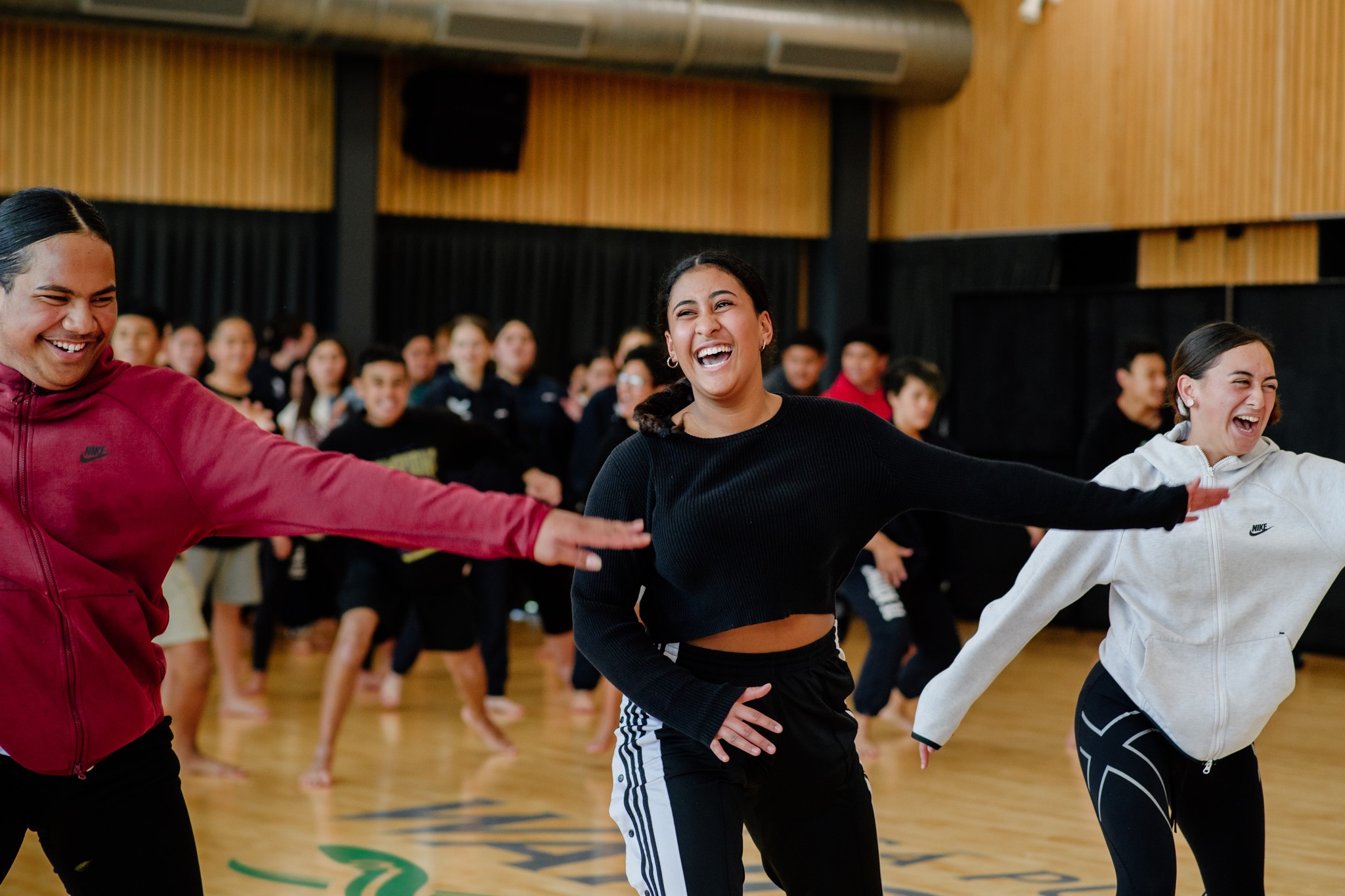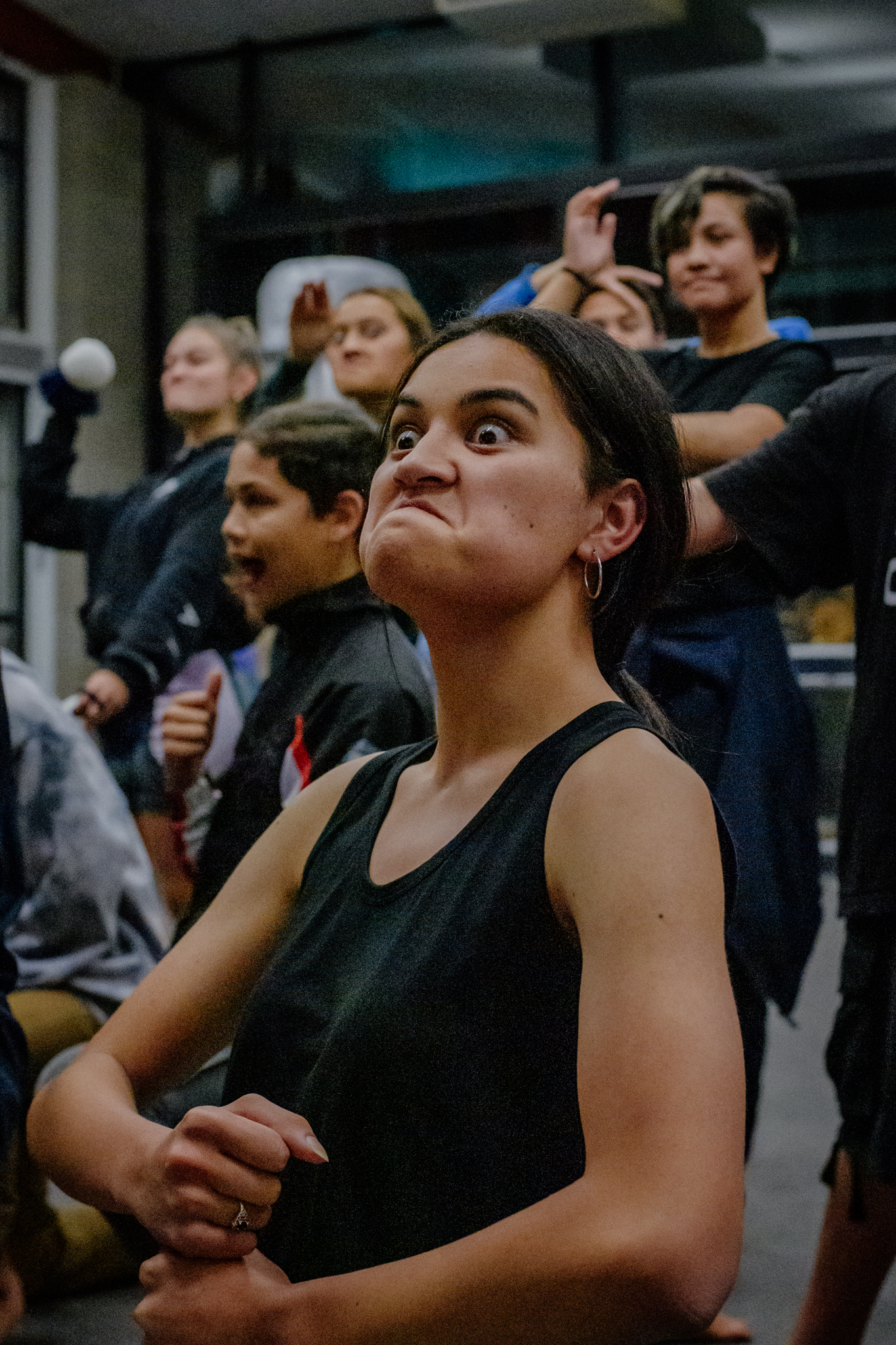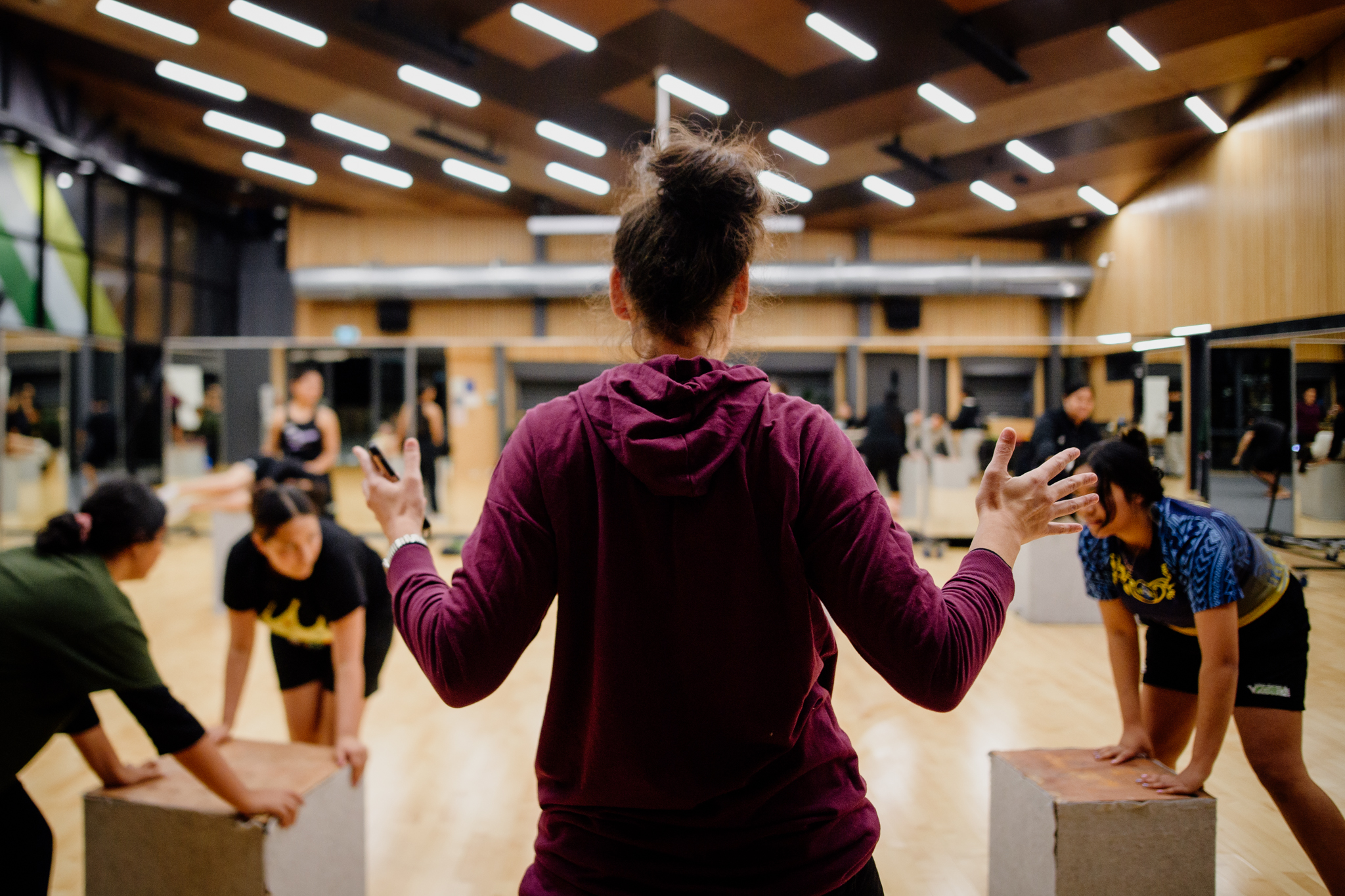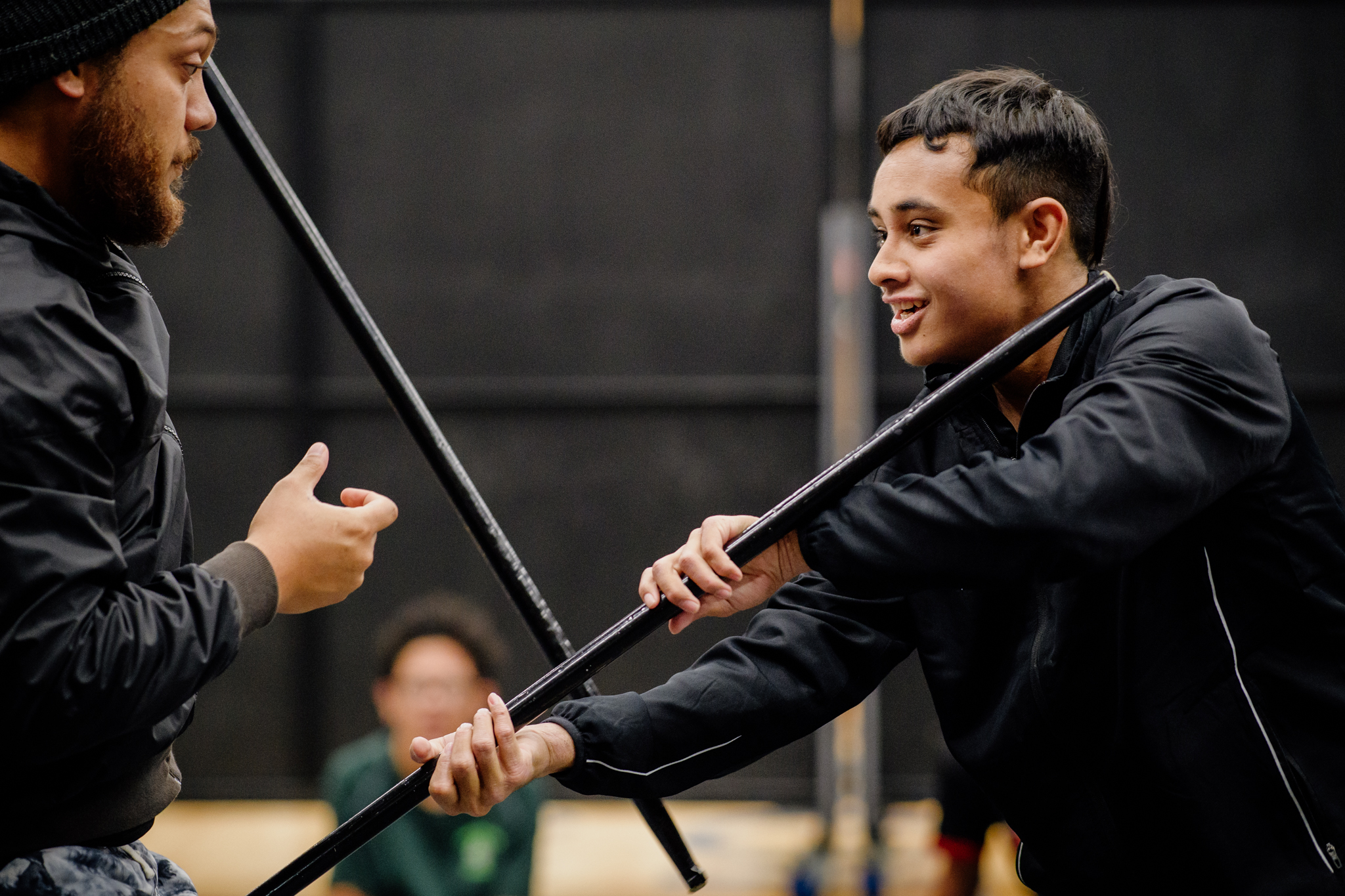The Matariki programme at Auckland Live welcomes the Māori New Year with shows and events that celebrate Māori storytelling, performance and celebration. Read more and go behind the scenes with the creators of Autaia – Haka Theatre.

Image credit: Jinki Cambronero
The mahi and vision of ‘Autaia’ – Haka Theatre
Auckland Live’s Matariki festival programme is underway. We attended rehearsal for one of the festival’s headline attractions, the new haka theatre ‘Autaia’.
By Richard Betts
Act I:
Te Kohe Tuhaka is surrounded by a ring of seated teenagers. It’s a decade since the actor played Shortland Street’s smouldering bad boy/undercover cop Kingi but he’s been on TV and film plenty since then and the kids all know who he is.
“This,” he tells them, “is a black box theatre. This is stage right; this is stage left – it’s always from the audience’s perspective.” Tuhaka (Ngāti Porou, Ngāi Tūhoe) speaks with almost religious zeal, as if the theatre is a sacred space.
“It’s not just another room; it has the power to move people.” He pauses before delivering the brimstone. “And the power to strike them down.”
We’re at The Auckland Performing Arts Centre (TAPAC) and the teens are all pupils at nearby Ngā Puna O Waiōrea Western Springs College. They’re rehearsing for Autaia, a new stage work being performed during Auckland Live’s Matariki Festival, in which the 25 or so young people here will be joined by similar numbers from two other Auckland schools, Te Kura Kaupapa Māori o Hoani Waititi and Te Kura Kaupapa Māori o Te Kōtuku.
It’s a pilot programme that Auckland Live Kaiarataki Toi Māori Kura Te Ua (Te Aitanga a Māhaki, Te Whakatōhea, Tūhoe, Te-Whānau-ā-Apanui, Te Rarawa, Te Aupōuri) hopes will catch on and be repeated in future years, with different schools. This show counts towards the kids’ NCEA qualifications, so there’s a good chance of that happening.
Much of the instruction takes place in te reo Māori. The kids all study in the kura kaupapa Māori language immersion system, and as a result they are bilingual and trained in kapa haka. Autaia, though, is not kapa haka. Te Ua describes it instead as haka theatre, which combines the customary Māori principles of kapa haka with theatre conventions.
To help, Te Ua has engaged seven mātanga toi, respected professionals, to advise on things like lighting, music, costume design, scriptwriting and acting.
Act II
Actor Tuhaka runs the students through the theatre elements of their presentation. It’s scrappy and, teens being teens, they are shy and embarrassed, whakamā, and talking to the floor as they read the script, a story that touches on mysticism and colonisation and the environment.
“They’re crack at kapa haka but this is the first time they’ve done this,” explains Te Ua.
Tuhaka takes the two lead actors away to work with them more intensively, beyond the scrutiny of their peers. Te Ua says it’s important for the young people to see mātanga such as herself and Tuhaka doing what they do.
“When I was at school I would latch on to anything I believed aligned with what I wanted,” says Te Ua. “All I wanted was to be a kapa haka performer, so any time I had an example of that, those people were pivotal for me – to have an example of what that looks like, what it feels like. These people are on the screen and some of these tamariki look up to them, so for them to be able to work closely with someone like Te Kohe is a dream.”
It’s not necessary to be a Shorty star to influence a child. School teachers are also central to preparing the performers for Autaia.
“We couldn’t do it without them,” says Te Ua.
Act III
While Tuhaka’s out of the theatre, Ngā Puna O Waiōrea’s Tuhoe Tamaiparea is running the kids through the kapa haka elements of their show. The students are more confident here than they were reading from a script. The moment they’re in formation they shake off their shyness and uncertainty slips away. They are in the zone but Tamaiparea is in no mood to go lightly.
“Animate, animate! Bigger!” he calls, all the while beating time. “Come on!”
One English translation of the word ‘autaia’ is ‘to be extraordinary, ‘better than expected’. In this context, watching the students perform extraordinary kapa haka is a humblebrag because these kids are very good indeed.
There is a sense, though, that putting on a good show is a secondary aim here. What does Te Ua want the kids to get from Autaia?
“I want to see and hear the tamariki come off stage with that feeling of elation, of having achieved something together. See their friends and whānau so proud of them. This may be one of the first experiences of their lives that they’ll always remember. They’ll look back and remember the mātanga pushing them, remember the full house, remember the lighting and the sound. And there are some really quiet, shy people who have been pulled out to play lead roles, so things like self-belief, that some of these kids who were hidden at the back are now at the front.”
Act IV
Tuhaka returns to the theatre after drilling his two lead actors, and takes charge of combining the theatrical and kapa haka parts of the performance. The actors are vastly improved but the scene is complicated, and the first few run-throughs are not entirely smooth.
“At the moment you’re falling into their energy,” Tuhaka says, the kids seeming to understand what he means. A lot of his instruction involves telling the performers to face the audience even as they interact with each other. It’s natural for actors but odd for anyone else – try talking to the person next to you while facing away from them – and Tuhaka must constantly remind the students.
“Don’t rob the audience of the opportunity to see you!”
Autaia’s audience is well served. This is a show with music, full lighting, a bunch of professional advisers and it’s being performed by 75-ish people in the 2000-seat Kiri Te Kanawa Theatre of the Aotea Centre, yet the tickets are just $10.
“Accessibility,” explains Kura Te Ua. “We want to grow an appetite for this kaupapa. A lot of the audience won’t have seen something like this before.”
What does she think they’ll see?
“That te ao Māori is thriving, that there’s a place for all of us, that our kids and culture are in good hands, and I hope people get some of the messages [in the show] around identity. I just hope the audience feels really proud.”
Act V
Te Kohe Tuhaka seems proud of how the kids are improving. They’re significantly better than they were two hours ago, and nearly there. Nearly.
“Again!” he commands. “From the top!”
7.00 pm
Tue 22 June 2021
Kiri Te Kanawa Theatre
Tickets $10



